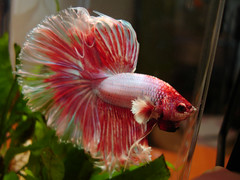Q: CWR wrote,
I am really hoping that you can help me. My betta fish, Pete, is on the bottom of the tank. He doesn’t come up to eat only for air. I am really worried about him. Is there anything I can do? Please let me know. I would really appreciate it and so would he.
A: I’m sorry to hear that your betta isn’t feeling well. There are a lot of things that can lead to the sluggishness and loss of appetite you are describing and most of them are caused by problems with water quality or temperature, or both. Since I don’t know anything about your aquarium set up or cleaning regimen I will just over the basics.
First and most importantly, bettas need clean water free from toxins like ammonia and nitrite which are produced from fish waste and decaying material. In a small tank without a filter or a new set up these toxins can build quickly and need to be monitored and controlled with lots of water changes. In an established tank with a filter helpful bacteria grow and breakdown the waste. We refer to tanks that have established these helpful bacteria as “cycled” meaning the nitrogen cycle has occurred there. I’m telling you this because fish kept in uncycled tanks have a far greater change of developing water quality induced illnesses.
For right now, the best information we could learn is the water parameters of your tank. These parameters include ammonia levels, nitrite and nitrate levels, pH, kh and gh, (KH and GH being less important) and temperature. You can either buy these test kits or bring a cup full of your tank water to a fish store like PetCo or PetSmart where they will test it for free to help you determine the problem. The employees there don’t always know what they’re doing so feel free to write down the results and email them back to me.
If you can find these out we may be able to figure out what is stressing your betta.
Another cause of sluggishness is water temperature. Bettas are truly tropical fish and really don’t do well in room temperature water. They really need a heated aquarium kept at a stable temperature between 78 – 80F. If your tank is unheated, I suggest finding a warm and most importantly, steady (temperature) area around the house to keep his tank. Some people find that on top of the refrigerator works well but if you are keeping your fish in a large tank that may prove difficult.
Without more information it’s really difficult to diagnose your fish but
I do suggest looking him over carefully for specific signs of disease. These may include, fuzzy white growths on the body, fins or mouth, deteriorating fins, blackened or bloody fin tips, redness under the scales, small white or rust colored spots, clear or white stringy poo, open soars or wounds or anything else atypical.
If you can, tell me more about your water and care and I can see if we can figure it out. Here’s a list of questions that would be really helpful to know…
How long have you had the betta?
What is the ammonia level? Nitrite, nitrate, pH, kh, gh levels?
What is the temperature?
What size is the tank? Is there a filter?
How long has the fish lived there?
Are there other tank mates? If yes, what kind and how long have they lived there?
How often do you clean the water? How much water do you replace at a time?
What do you add to the tank water? Include any and all conditioners and medications.
How much do you feed your fish? What kind of food and how often are you feeding?
Any other info you think might be helpful?
I know this seems like a lot but diagnosing a fish is basically the same as a human or other pet so a lot of questions are necessary.

i bought him s bigger fish tank for him and now he is just hanging at top of water very listless….what do i do
I’ve had Johnny about 1yr. couple wks ago noticed he’s not eatting, & blotted. He also had a long stringy whitish hanging under his Ventral Fin area!! Tried the blanched pea, changed his food, &” Betta Fix.” Seemed to work,but now string hanging again & not eatting nothing.Trying “Betta Fix” again today, calls for half tsp for 7days, What is wrong w/Johnny, what should I do? He was always a active guy!!!
My betta fish has been hanging around the bottom,and not eating his food, I don’t think that the tank size or temperature is the problem he is a marble betta fish, he changet golon and now he is changing color again. He lives in a 10 gallon tank it was three weeks ago I think I did a water change. Will fin rot cause this because his fins are a little jagged. I really need to know what’s happening.